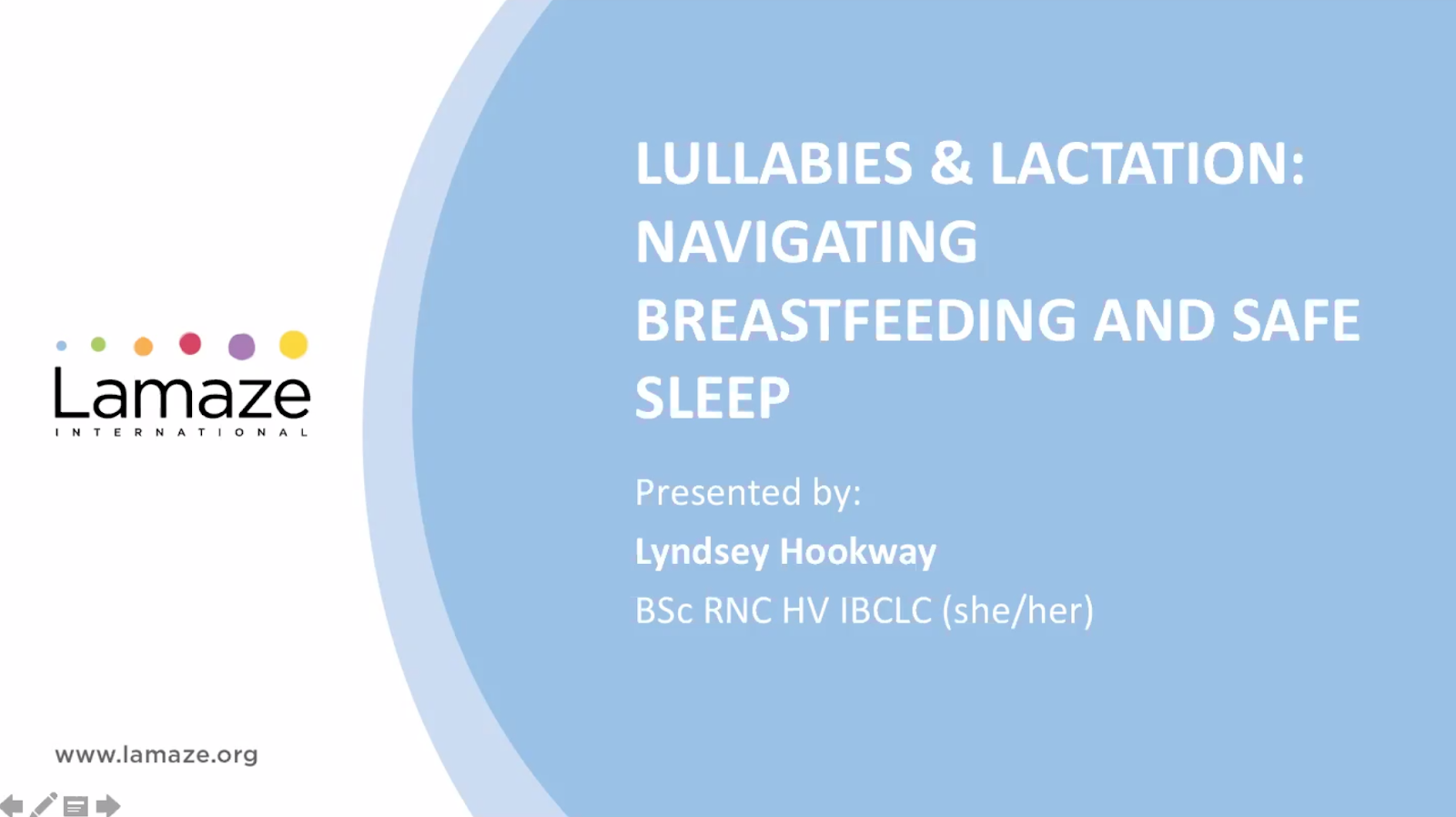Review of “Lullabies and Lactation: Navigating Breast/Chestfeeding and Safe Sleep” Webinar - A Useful Tool for Educators
By: Sharon Muza, BS, CD/BDT(DONA), LCCE, FACCE, CLE | 0 Comments
The webinar “Lullabies and Lactation: Navigating Breastfeeding and Safe Sleep” is sponsored by the Boppy Company, LCC in a cooperative agreement with Lamaze International. The opinions expressed in this review are independent of the sponsorship and solely belong to the author.
Childbirth educators and other perinatal professionals work hard to share evidence-based information and resources in a culturally sensitive manner. They also strive to strike a balance with families’ expectations and the accurate realities faced during the transition to parenthood with a young infant. This webinar, “Lullabies and Lactation: Navigating Breastfeeding and Safe Sleep” presented by Lyndsey Hookway, Bsc, RNC HV, IBCLC, is an amazing resource for childbirth educators and other perinatal professionals who want to provide families with resources grounded in research while acknowledging the challenges that having a new baby brings.
In this webinar, Lyndsey recognizes that many perinatal professionals are challenged with sharing information that is accurate, does not contradict national organizations such as the American Academy of Pediatricians, and respects both research and the cultural norms of many families. Best practices for nighttime parenting a new baby can get messy very quickly.
In this concise one-hour webinar, participants learn the definition of Sudden Infant Death Syndrome (SIDS), which babies are more likely to be at risk for SIDS and when, and takes a big picture look at the countries that have the highest rate of SIDS deaths. (Spoiler: the USA leads them all!)
Educators learn what are the modifiable and known risk factors for SIDS so that they can share information with families about they can do to reduce the risk of a SIDS death. The normal nighttime feeding needs of a young infant are explained with a fascinating examination of the hormones at play that cause infants to rely on the frequent nighttime feedings that disrupt parent sleep and make those first months so difficult and exhausting.
Helping parents to know what is physiologically normal for human babies and what they can expect, along with some “night hacks” as Lyndsey calls them, supports families to understand how to survive and thrive. This webinar does that and more!
Bedsharing can be a critical component of successful nighttime parenting, but mixed messages often cause parents to bedshare unsafely or go underground with their chosen family's sleep habits. Lyndsey shares current recommendations from many English speaking industrialized nations and helps educators to confidently discuss safe bedsharing, the realities of breast/chestfeeding responsively at night and how human milk is a protective factor for SIDS. The educator can share information that helps families decide how they want to nighttime parent their young infant.
If you have ever struggled with how to address nighttime feedings, bedsharing and the many challenges of parenting a young baby with your classes or clients, this webinar will help you to organize your thoughts into effective talking points when discussing these topics. Educators have a responsibility to communicate realistic expectations and current best practices in a culturally sensitive manner. After watching this webinar, I felt like I could better organize key points and communicate them clearly to the families I work with. When new parents understand the nighttime needs of their young babies, have a chance to brainstorm solutions for meeting everyone’s needs and are helped to recognize what parents can do to protect babies from SIDS and respond to infant nighttime needs effectively, everyone wins.

I invite you to watch this webinar, available in the Lamaze International Continuing Education Online Learning Modules Center. Learners will need to login to access the course. A login can be created at no cost if this is the first time accessing online learning modules. Not only will you receive continuing education credit but you will be updating and honing your skills so that you can continue to provide the families you work with the very best in evidence-based information and childbirth education.
Published: October 17, 2019
Tags
BreastfeedingChildbirth educationBedsharingContinuing EducationSharon MuzaChestfeedingBreast/ChestfeedingBoppyLacation